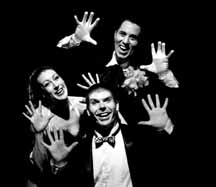
Al Jolson: A Vaudeville
 |
| "Al Jolson, a Vaudeville" |
Written by James Racheff and Ted Kociolek
Directed by Gary Slavin
Pelican Studio Theatre
750 Eighth Avenue (between W. 46th and W, 47th streets) 6th floor
Thursday and Friday at 8 p.m., Saturday at 3 and 8 p.m.
$15; Box Office (212) 613-5839
Opened April 10, plays through April 26
Reviewed by Paulanne Simmons, April 18, 2003
Al Jolson may have died in 1950 at the age of 65, but at the Pelican Studio Theatre on Eighth Avenue the self-proclaimed "World's Greatest Entertainer" lives on.
John Sannuto stars as the charismatic singer in "Jolson: A Vaudeville," and he has so mastered Jolson's voice and mannerisms one suspects the singer's own "Mammy" might not be able to tell the difference.
Directed and choreographed by Gary Slavin, with musical direction and arrangements by Ted Kociolek and a book by James Racheff and Ted Kociolek, the revue traces Jolson's life and career from his birth in 1885 in Lithuania to Cantor Moses Yoelson and his wife Naomi, through his youth in Washington, DC, to his rise as a star of Vaudeville, Broadway and Hollywood, and his eventual fall from favor in the 1940s.
The revue uses a vaudeville format replete with skits, comic routines, minstrel shows and scenes from silent movies - with titles (presented on cue cards) like "A Wandering Minstrel, I," "The Jazz Singer: A Not-So-Silent Movie," and Wedding Belles [1, 2, 3 and 4 - one for each wife]"
Jolson: AVaudeville is minimally staged, but Julia Riva has supplied lavish costumes reminiscent of the era - white gloves, striped pants, checked suits, straw or bowler hats, net stockings and skimpy showgirl corsets. Add to this the well-researched musical arrangements and Barbara Parisi's effective lighting, and here's a show that will bring audiences back 75 years to, if not a more happy, at least a more hopeful time.
Although the play highlights Sannuto's brilliant portrayal of Jolson, it also features excellent supporting performances by Kyrst Hogan, who plays the showgirl, Hedda Hopper, Jolson's four wives (including the dancing phenomenon Ruby Keeler), and any other female role; and Scott Darby, who is the master of ceremonies, an old German professor, Jolson's father, Walter Winchell, and any other male role.
Jolson: A Vaudeville contains many of Jolson's most famous songs: "You Made Me Love You," "Rock-a-Bye Your Baby with a Dixie Melody," "Toot-Toot-Tootsie," "Alexander's Ragtime Band," "Swanee," "My Mammy," "Anniversary Song," "Sonny Boy" - many of which, for those of us born after the Jolson era, are familiar as vehicles for other entertainers or are so much a part of America's musical heritage that, like folksongs, we think they belong to everyone and no one.
Happily, Jolson: A Vaudeville doesn't shy away from the most controversial part of Jolson's career - his use of blackface. Rather Racheff and Kociolek have chosen to place Jolson's "coon songs" in their proper historical prospective. Some people may have a problem with this. But whatever your opinion, Jolson: A Vaudeville will certainly give you something to think about while you're humming one of the many tunes you just can't seem to get out of your head.
Jolson: A Vaudeville may be your best buy on or off-Broadway.
And even if you've seen all the other shows, if you haven't seen this one,
as Jolson' himself would say, "You ain't heard nothin' yet." [Simmons]

| museums | NYTW mail | recordings | coupons | publications | classified |